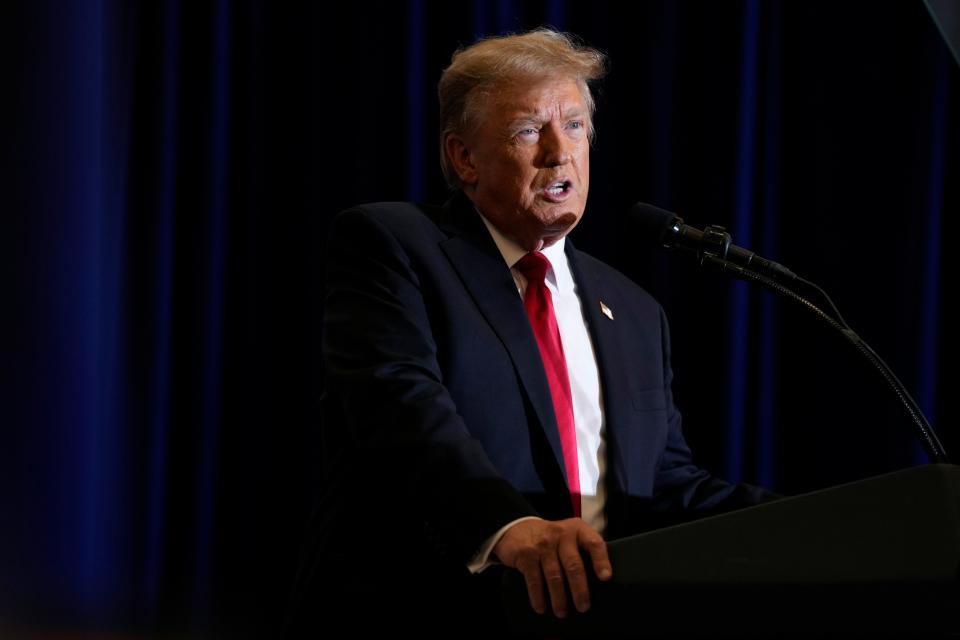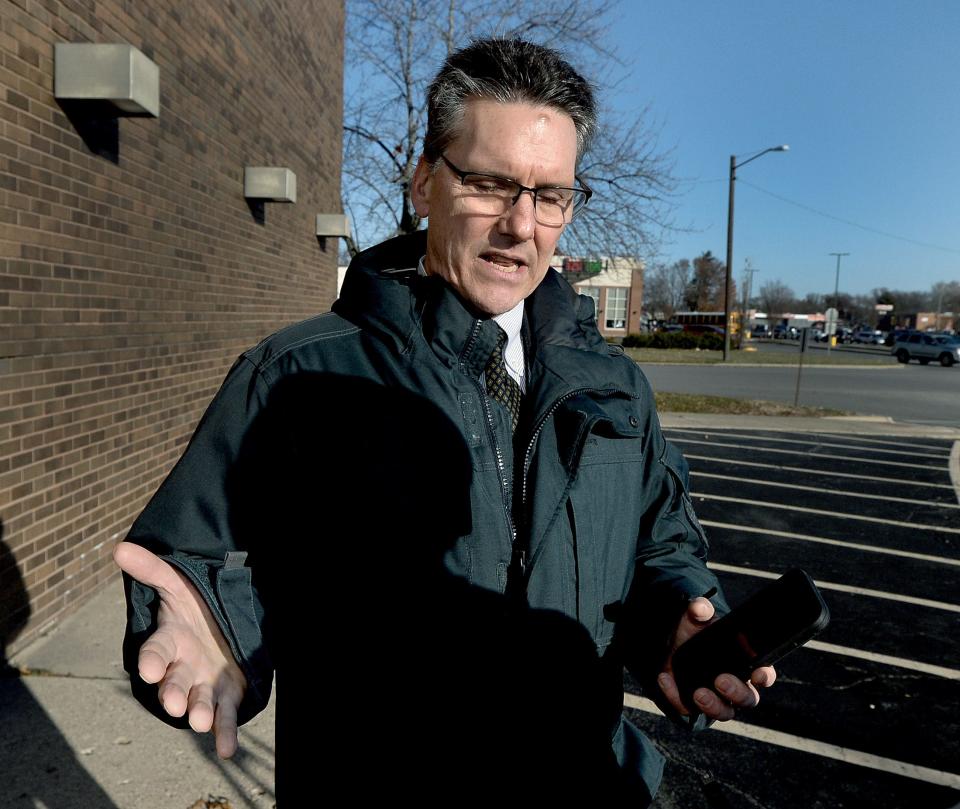Does the objection to Trump on the Illinois primary ballot have a chance? What we know
- Oops!Something went wrong.Please try again later.
- Oops!Something went wrong.Please try again later.
Illinois became the latest state to receive a formal objection to former President Donald Trump's 2024 campaign on Thursday, kicking off a process that could remove his name from the March primary ballot.

Filing with the Illinois State Board of Elections, five objectors maintain Trump incited an insurrection at the U.S. Capitol on Jan. 6, 2021 and, therefore, is ineligible to seek public office under the 14th Amendment. Voters in Illinois and Massachusetts both placed petitions on Thursday, now among the 19 states to do so.
More: Trump candidacy challenged as presidential candidates file nomination papers
The insurrection clause is a remnant of the post-Civil War era, used to block ex-Confederates from holding public office. Legal tests of the standard in Illinois, University of Illinois Springfield legal studies professor Deborah Anthony said have never taken place until this week.
"It's completely unprecedented," Anthony, a professor with the department since 2006. "The 14th amendment has never been applied, one to a president before and very, very rarely applied to anybody outside of the Civil War context."

Trump's name has been removed from the ballots in Colorado and Maine so far — which his campaign is challenging — but judges in Arizona, Michigan, and Minnesota have denied objections. The Oregon Supreme Court is also weighing whether or not to keep the former president on the ballot.
The U.S. Supreme Court agreed to review Colorado case on Friday with an oral hearing scheduled for Feb. 8.
The variety of rulings, Anthony said, comes in part because of the unclear nature of what constitutes an insurrection and how it differs from a riot. The exact language of the clause, contained in Section 3 of the 14th Amendment, she said is broad and does not explicitly define an insurrection.
"Now we have a situation where we're not clear on the full scope," she said.
To whom the clause applies is another aspect at play. The insurrection clause lists senators, representatives, electors of the president and vice president, and all others “under the United States,” but doesn’t name the presidency.
More: When does early voting start? Here are answers to your Illinois election questions
Defense attorneys have argued Trump, as president, does not fit the definition and therefore is not subject to the clause. A lower court in Colorado agreed but the state's high court overturned it — the first time a presidential candidate was removed from a ballot through the insurrection clause.
Supporters of the former president like U.S. Rep. Mary Miller, R-Oakland, said the objection was politically-motivated with Trump as the overwhelmingly leading GOP candidate. She also is a Trump GOP convention delegate.
"They know Trump will defeat Biden in a free & fair election," Miller posted on X, formerly Twitter. "Democrats are embracing banana republic tactics by trying to jail their political opponents and throw them off the ballot."
🚨Leftwing activists are trying to REMOVE PRESIDENT TRUMP FROM THE BALLOT in Illinois. Democrats across the country are attacking our democracy by trying to take away your right to vote for President Trump because he is leading Joe Biden in the polls. They know Trump will defeat… pic.twitter.com/9ABzigtUZv
— Mary Miller (@Miller_Congress) January 4, 2024
The sentiment has pushed some to remove the courts from the matter to avoid the political narrative and instead let the voters decide, Anthony said, Wisconsin Democratic Gov. Tony Evers among them.
Gov. JB Pritzker supports judicial involvement, saying Trump incited the Jan. 6 insurrection.
“Courts need to decide on the merits of these arguments, but, regardless of how these efforts play out in court, voters know this and will reject Trump’s anti-democratic, anti-freedom ideology once again in November,” said Pritzker campaign spokeswoman Christina Amestoy in an email.
Answering the question of Trump's eligibility could also be delayed if he is elected, Anthony said.
"The political party can put whoever they want on the ballot and the 14th Amendment doesn't even come into play at that point," she said, using Michigan as an example. "So, they could list anybody who is not eligible for all this and then the question of whether they can take office comes later."
How does the objection process work?
Objections to presidential candidates nomination papers can be filed with ISBOE through Jan. 12, which in past years have been mostly placed due to an insufficient number of signatures. Democratic and Republican presidential candidates are required to have at least 3,000 registered voter petition signatures.
Matt Dietrich, ISBOE spokesperson, said the state election authority's process will begin on Jan. 17 with the selection of a hearing officer who will meet with both parties to discuss their case. That officer will then report their findings with ISBOE's general counsel, later providing a recommendation to its bipartisan, eight-member electoral board on Jan. 30. A majority vote is required for the objection to move forward. In the case of a tie, the objection is dropped.

Objectors and the candidate, however, can seek judicial review, meaning any legal challenges likely would be ongoing when early voting starts on Feb. 8. The Illinois Supreme Court, holding a 5-2 Democratic majority, could be a favorable venue for the objectors.
Who's running?
Democratic and Republican presidential candidates had until 5 p.m. Friday to file nomination papers with ISBOE.
Trump is among five GOP candidates who filed including Florida Gov. Ron DeSantis, former South Carolina Gov. Nikki Haley, former New Jersey Gov. Chris Christie, and Ryan Binkley of Texas. Vivek Ramaswamy did not file.
President Joe Biden, author Marianne Williamson, Minnesota congressman Rep. Dean Phillips and Frankie Lozada filed as Democrats. Independent and new party candidates such as Robert F. Kennedy Jr. can file starting June 17.
ISBOE will hold its next meeting in Springfield on Jan. 11. The board will certify the ballot and make rulings to objected nomination papers of congressional, state legislature, and judicial candidates.
More: Illinois House District 95 candidate withdraws from race after being short of signatures
Trump, Dietrich said, will likely be certified to the ballot with "objection pending" next to his name. No other presidential candidate received an objection before the Friday deadline.
More than 60 objections had been filed with ISBOE as of Friday. Two of them were filed against local candidates — Republican Kelvin Coburn and Democrat Kristen Chiaro both of Chatham — running in Illinois House District 95. Coburn has since withdrawn from the race.
The Associated Press contributed to this report.
Contact Patrick M. Keck: 312-549-9340, pkeck@gannett.com, twitter.com/@pkeckreporter.
This article originally appeared on State Journal-Register: Illinois State Board of elections to decide Trump's ballot eligibility

